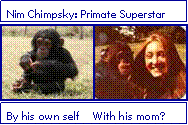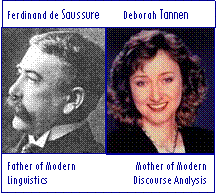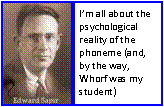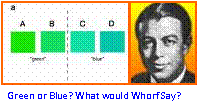Saturday, April 5, 2008
How do you say that word? Name? City?
http://www.forvo.com/tag/famous_people/
Friday, April 4, 2008
Morphology power point slides
One fancy Turkish word and agglutination
Thursday, April 3, 2008
So, a Japanese snake talks in syllables. . . (onomatopoeia)
http://www.npr.org/templates/story/story.php?storyId=4699514
http://www.flat33.com/bzzzpeek/index1.html#
Tuesday, April 1, 2008
ipa practice from a few weeks ago, us being weird in class (ok, me being weird)
compliments of kiana
wʌns ǝpan ǝ taɪm ðɛr wʌz ǝ klæs fʊl ʌv brɪljǝnt ægiz hu wɚ ɪn lʌv wɪθ ði aɪ pɪ e, wɪʧ sɝvd ðɛm wɛl bikaz ðɛr wʌz lats ʌv aɪ pɪ e trænskrɪpʃǝn an ðɛr mɪdtɝm ɛgzæm.
wat ɪz ǝ fon? ɪnibadi? ɪnibadi??! raɪt! ɪts ǝ ra ʌnkætǝgɔraɪzd saʊnd-æn ǝkustǝk riælǝti--ɪt kænt bi riprǝdust baɪ ǝ hjumǝn -- waɪ?! (ɔr aɪ?!) so ǝ fon ɪz laɪk æn ivent (ivɪnt).
ʃi hæd ǝ begǝl ɝliɚ - wi stɪl donʔ no wat kɛli ɪz itɪŋ. pɝsǝnǝli, aɪ hæd maɪ juʒuǝl hatkeks ænd sasǝʤ wɪɵ ǝ larʤ daɪǝʔ kok frʌm mɪkdanǝldz (mǝkdanǝldz) ɪn maɪ kar ɪn ðe parkɪŋ lat æt sent mɛriz, waɪl wetɪŋ an ðǝ dud hu teks maɪ mʌni tu gɛt ðɛr ænd gɪv mi ǝ pæs.
Oke, ǝ fonim, æʃli, ɪz dɪfrǝnt frʌm ǝ fon haʊ? æʃli ar ju ðɛr? æʃli?!! ǝpɛrǝnʔli æʃli hæz slɪpt ɪntu a komǝ raɪt bihaɪnd maɪ vɛri aɪz. ɪz ʃi dɛd?!? kwɪk, sʌmbʌdi ʧɛk hɝ pʊls! kwɪk laɪk ǝ bʌni! aɪ donʔ hir ɪni æktɪvǝti—ju ar e hartlɛs kruǝl grup ʌf pipǝl. Raksi, ɪz ʃi ǝlaɪv? ʤuljiǝ? ɪz æʃli ǝlaɪv?











